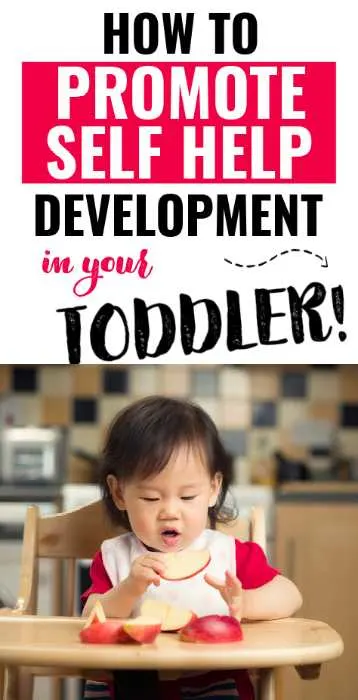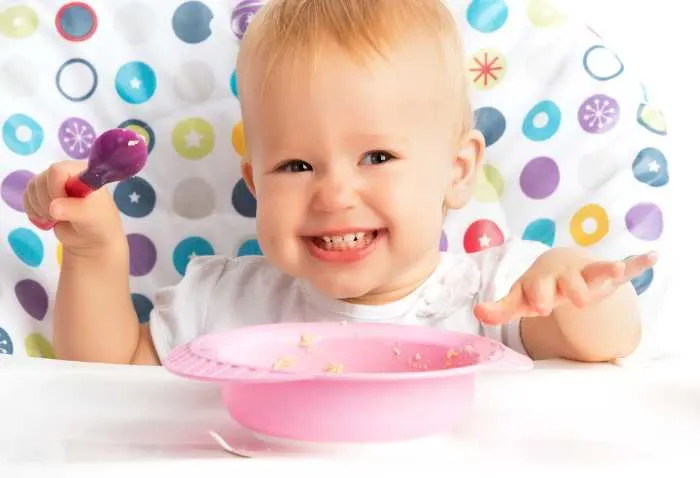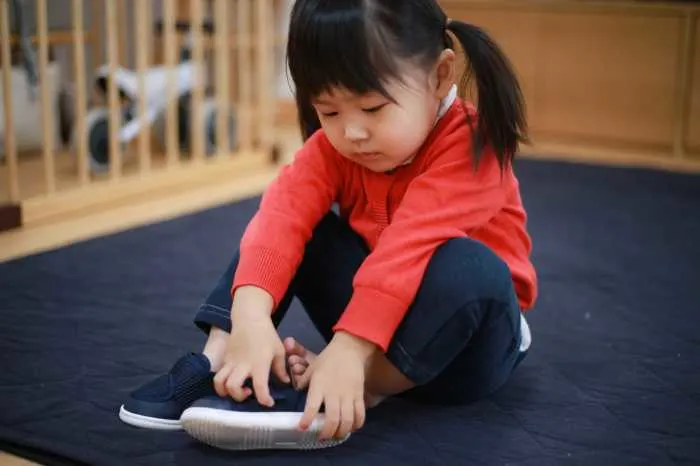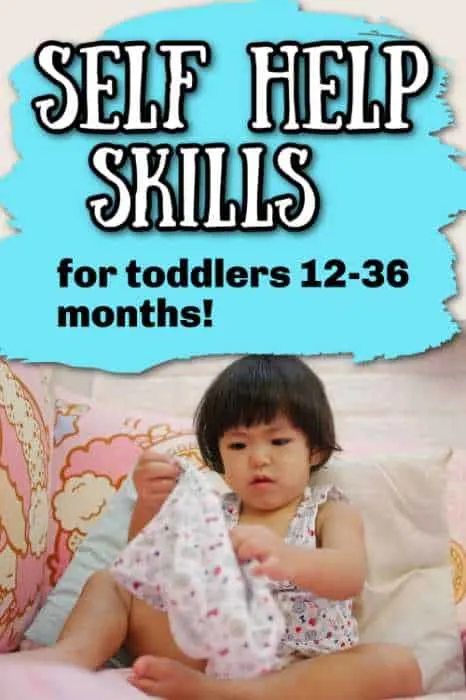(This post may contain affiliate links. To read our full disclosure policy click here.)
Toddlers are on the verge of becoming little kids.
They are learning new skills at an amazing pace and their self-help skills should be a priority for parents.
This blog post will teach you what to expect from 12-36 months, how to encourage adaptive skills through play and daily routines as well as some helpful tips to work with challenging behaviors.
What are some self-help skills for toddlers?
Important self-help skills start when your little one is just a baby and they will continue to develop throughout the years.
Some examples of self-help skills include:
- Self-feeding
- Undressing/dressing
- Drinking out of an open cup
- Using the toilet independently
- Brush teeth
- Wash hands
- Daily chores
The skills in this domain are so important because they are the life skills your little one needs to gain independence!
All Children Develop on Their Own Timeline
While every child is different and will develop their self-help skills at their own pace, there are general guidelines that parents can follow to get an idea of what to expect.
Know that there is a wide range of normal when it comes to young children.
If you do have concerns about your child make sure to contact early intervention for a free screening or evaluation.
Toddler Self Help Skills 12-18 Months
If you haven’t tried drinking from an open cup with your little one now is a great time!
Over the next few months, they should be able to hold their cup and drink from it independently.
This skill requires lots of practice so be prepared for some spills!
Another emerging skill when it comes to mealtimes is using utensils.
At this age, they are mainly practicing and will get closer to mastering as they near their second birthday.
You may also notice your child wanting to participate more when getting dressed and undressed.
Look for them to start being able to remove their own socks and put a hat on their head.
Toddler Self Help Skills 18-24 Months
Your toddler should start to should start distinguishing between edible and nonedible objects more consistently.
They continue to gain more skills to help with dressing and undressing like being able to unzip a large zipper.
Is your little one starting to show interest in using the potty?
If they are this is a good time to follow their lead with it and introduce potty learning in low-pressure ways such as reading books about it or letting them sit on a small potty.
You can also start working on having your little one wash and dry their hands.
This is a great thing to practice and incorporate into your mealtime routine.
Toddler Self Help Skills 24-36 Months
Is your child starting to help with clean-up time?
You can incorporate them into clean-up time by having them put things away.
Getting undressed should be getting easier for your child but they may still need some assistance.
Between 30-36 months you may notice your child wanting to do things by themselves and insist on being independent so you will want to make sure there is extra time during routines for them to do things on their own as it may take them a bit longer.
Your toddler may be interested in helping set the table or helping out with other chores throughout the day.
How to Encourage Self Help Skills Through Play
Play is the language toddlers speak so utilize it whenever you are trying to teach a new skill or introduce a new topic.
There are lots of ways to encourage your little one to practice self-help skills through play.
They can work on these skills through pretend play, gross motor activities, sensory play, and more.
Grab your FREE Milestone Guide HERE.
Teach Important Skills Through Imaginary Play
Using pretend toys like baby dolls to allow them to practice dressing and undressing.
You can also introduce topics such as potty training or brushing teeth through play to make them more familiar for your child as well.
It also gives you the opportunity to model how things are “supposed” to be done which helps them learn in new ways.
If your toddler is struggling with brushing teeth, then giving them a doll and an extra toothbrush to “play” with can be a great way to help them learn how to do it and get more comfortable with it.
Topics like potty learning can also be brought up at playtime as well.
Fine Motor Play to Build Skills needed for Daily Tasks
Fine motor play activities are a great way for toddlers to practice the skills needed for tasks such as brushing teeth, getting dressed, and more.
These tasks all require coordination of fine motor movements and building those skills can support your toddler with daily tasks.
Activities like finger painting, water play, and building with blocks are all great ways to help build up fine motor skills needed for self-help tasks.
How to Encourage Self Help Skills Through Daily Routines
One of the best ways you can support these self-care skills is by just following your child’s lead when it comes to everyday tasks.
Instead of just automatically zipping their coat or putting on their shoes for them, wait for a beat and give them the opportunity to try.
You may be surprised at how quickly children learn to put on their own clothes and their own shoes!
We get into a hurry sometimes and forget to give them the opportunity to do these self-care tasks because it does take them longer to do it when they are learning.
If they are struggling with something, you can always step in and help if needed.
You may also want to give your toddler some “chores” that will help them practice these skills on their own and build up confidence.
For example, instead of cleaning up toys after playtime, you can give your toddler the task of putting away their stuffed animals.
Read Books about Self Care Skills
Reading books with your child allows you to explore so many different topics including things like independent dressing and potty training.
Books give us a low-pressure way to talk about these skills and give examples.
You can see my list of books that talk about these skills in children here.
Be Patient with the Learning Process
Toddlers are naturally curious and love to explore their world.
They also practice adaptive skills through play which is why it’s important for them to have plenty of opportunities during the day.
Whether you’re working with your toddler one-on-one, incorporating self-help skills into daily routines like mealtime, or playing games that encourage these skills–doing so will not only make life easier for both of you but will also help develop the necessary fine motor movements needed later in life when they need to brush teeth, get dressed, etc., independently.
Click here to get more ideas on how to inspire learning for your toddler all day long.
Related Posts You Will Enjoy
Toddler Independent Play Ideas to Get You Started
Simple Activities to Promote Sharing and Turn Taking
Complete Developmental Milestones Checklist
Social Development Activities for 1-2 Year Olds
Frequently Asked Questions About Self Help Skills for Toddlers
There are many different self-help skills that toddlers can learn and master.
Some of the most common ones include: dressing and undressing, brushing teeth, using the toilet, hair care (combing/brushing), feeding oneself, and more.
include: going through everyday routines and encouraging your child to do whatever they can independently, providing opportunities for playtime, setting up activities to practice these skills (like toothbrushing), reading books about them together so they can see examples.

Kayla O’Neill has a master’s degree in education as well as a bachelor’s degree in special education with an emphasis in early childhood education. She has been working as a developmental therapist with babies and toddlers in early intervention since 2012. She is also a mom with two young children.




